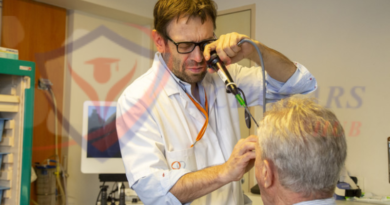Study of Skin Disease & Research Work: Dermatologist Carrying Out Results
Over the ages, dermatology, the discipline that studies skin, has experienced tremendous change. The field of dermatology has been defined by significant figures and discoveries since the earliest accounts of skin conditions appeared in Egyptian papyri, Hippocratic texts, and early treatises on the subject. Based on the earliest dermatosis classifications, diagnostic techniques, and pharmacological treatments, the specialty solidified as an area of medical research in the 18th and 19th century. The scientific and technical revolution of the 20th century brought new treatment resources, surgical techniques, and cosmetic operations to dermatological practice, changing it forever.
Skin diseases are a major global health concern, affecting millions of people worldwide. These conditions can cause a variety of physical, psychological, and social problems. Research into skin diseases is essential to develop new and improved treatments, preventions, and cures. However, it is important to conduct this research ethically, ensuring that the rights and well-being of participants are protected.
Related Article: Ethical Research and Study of Skin Diseases: How Dermatologist Researchers Work?
Ethical Principles in Skin Disease Research
The following are some of the key ethical principles that should be considered when conducting research on skin diseases:
- Respect for persons: Participants should be treated with respect and dignity. Their autonomy should be respected, and they should be given the opportunity to make informed decisions about their participation in research.
- Beneficence: Research should aim to benefit participants and society as a whole. Potential risks and benefits should be carefully weighed, and measures should be taken to minimize harm.
- Justice: Research should be conducted in a just and equitable manner. All participants should have access to the benefits of research, and there should be no discrimination on the basis of race, ethnicity, gender, or other factors.

Beyond the Skin
Aimee Payne, MD, PhD, a professor of Dermatology in the Perelman School of Medicine at the University of Pennsylvania, described skin as a “gold mine for basic scientists,” saying that “there is a good chance you can find it in the skin if you’re looking to study a particular cell type from the human body.”
Payne claims that practically every field of fundamental science has an application to the skin. For example, the skin has neurons, vascular cells, immune cells, and epithelial cells, all of which are involved in conditions including cancer, ageing, itchiness, pain, autoimmune, and infection.
There are other advantages to concentrating on the skin besides the variety of cells. Numerous external germs and forces come into touch with the skin and its constituent cells, changing or influencing them.
In addition, the skin is a perfect test subject when it comes to other bodily organs. In addition to being able to be tested topically, medications can also be evaluated via biopsying the skin rather than internal organs as necessary in order to examine cells.
Source: pennmedicine.org
Dermatologist Researchers’ Role in Ensuring Ethical Research
Dermatologist researchers play a key role in ensuring that research on skin diseases is conducted ethically. They must be familiar with ethical principles and guidelines, and they must be able to apply these principles to their research. They must also be able to identify and address potential ethical issues that may arise during the course of their research.
Related Article: What is “Skin of Color” in Dermatology Education? Dermatologist Specializing in African American Skin
Specific Ethical Considerations in Skin Disease Research
There are a number of specific ethical considerations that need to be taken into account when conducting research on skin diseases. These include:
- Informed consent: Participants must be given adequate information about the research, including the purpose, risks, and benefits. They must also be given the opportunity to ask questions and to decide whether or not to participate.
- Confidentiality: Participants’ personal information must be kept confidential.
- Vulnerable populations: Special care should be taken when conducting research with vulnerable populations, such as children, pregnant women, and people with disabilities.
- Use of human tissues and samples: The use of human tissues and samples must be carefully regulated.
- Commercialization of research: Researchers should be aware of the potential for conflicts of interest when conducting research that is funded by industry.

A Medical Enigma Resolved
Terrie Tarbox’s experience serves as an example of several significant developments in dermatology. She received standard care following her diagnosis, which included taking the steroid prednisone. Either the therapies had no effect at all or had a brief effect. She needed to use a wheelchair and use painkillers to manage her discomfort due to sarcoidosis. She was compelled to leave the Army on medical grounds.
Tarbox experienced relief in 2018 when she started receiving treatment at the VA Connecticut Healthcare System with tofacitinib (Xeljanz), a class of medication known as a Janus kinase (JAK) inhibitor. Brett King, MD, PhD, associate professor of dermatology, and William Damsky, MD, PhD, assistant professor in dermatology and dermatopathology, started treating Tarbox with these medications.
The medication was administered off-label, but the outcomes were astounding. Her skin cleaned up totally, her vision cleared up, and her discomfort decreased. Tarbox is excited to travel with her spouse as the COVID-19 threat lessens and she can now spend time with relatives and friends. She advised going to a doctor if someone else developed skin rashes that they were unable to get rid of. Sometimes a closer examination is necessary.
Damsky and King started a study to evaluate tofacitinib on ten more sarcoidosis patients around the same time. The outcome was overwhelmingly favourable. While the skin cleared up entirely for six individuals, the other patients reported notable improvements. In a few instances, internal organs also shown notable improvements. Additionally, the majority of patients were able to stop taking prednisone and other traditional immunosuppressive medications.
The advancements aided in the researchers’ comprehension of the molecules that sustain inflammation in sarcoidosis and the mechanisms by which JAK inhibitors, such as tofacitinib, function in this illness. Researchers discovered that the treatment inhibited interferon gamma, a crucial protein that malfunctions and causes sarcoidosis. “The aetiology of sarcoidosis remains unknown. According to Damsky, the cause is most likely a mix of poor luck, environment, and heredity. “However, we now know more about the signals that lead to inflammation in sarcoidosis and how to block them.”
Related Article: How Skin Disease and Disorders Affect Your Psychology
Oversight of Skin Disease Research
Research on skin diseases is subject to oversight by a number of bodies, including:
- Institutional review boards (IRBs): IRBs are responsible for reviewing research proposals to ensure that they are ethical.
- Government agencies: Government agencies, such as the National Institutes of Health (NIH) in the United States, have regulations in place that govern the conduct of research.
- Professional organizations: Professional organizations, such as the American Academy of Dermatology (AAD), have ethical guidelines that their members must follow.
Last Words
Ethical research is essential to advance our understanding of skin diseases and to develop new and improved treatments, preventions, and cures. Dermatologist researchers play a key role in ensuring that research is conducted ethically. By following ethical principles and guidelines, researchers can help to protect the rights and well-being of participants and contribute to the advancement of knowledge and the improvement of human health.




